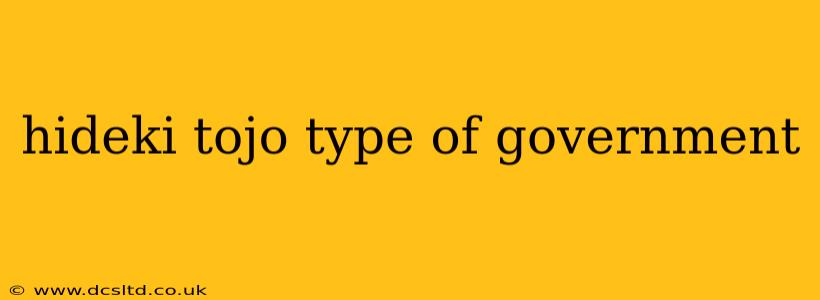Hideki Tojo's government in Japan wasn't a simple dictatorship; it was a complex system built on a foundation of imperial rule heavily influenced by military power. Understanding its nature requires looking beyond simple labels like "fascist" or "militarist" to grasp its unique characteristics.
While Tojo held the position of Prime Minister, and wielded immense power, he operated within a system where the Emperor Hirohito remained the nominal head of state. This was crucial. The Emperor's authority provided a veneer of legitimacy to the government's actions, even the most brutal. The government carefully cultivated the image of the Emperor as a divine figure, thus justifying actions in his name.
This makes labeling Tojo's regime straightforwardly as "fascist" problematic. While it shared certain characteristics with fascist regimes in Europe, the ideology wasn't strictly aligned with that of Mussolini's Italy or Hitler's Germany. The emphasis was less on a specific ideology and more on the unification of the nation under imperial rule and the expansionist aims of the military.
What kind of government did Tojo lead?
Tojo's government was best described as a military dictatorship operating under the guise of imperial rule. The military held disproportionate power, influencing policy decisions, controlling resources, and directly participating in the governance of the nation. The military's influence extended into all aspects of Japanese life, shaping education, propaganda, and the economy.
Was it a totalitarian regime?
Yes, in many ways, Tojo's government exhibited characteristics of a totalitarian regime. It exerted extensive control over all aspects of Japanese society, suppressing dissent, and using propaganda to control the flow of information. Political opposition was ruthlessly suppressed, and individual freedoms were severely curtailed. The secret police played a significant role in maintaining the regime’s authority, similar to the Gestapo in Nazi Germany or the NKVD in Stalin's Soviet Union.
How did the Emperor fit into the system?
The Emperor Hirohito's role was paradoxical. While nominally the supreme authority, he largely allowed the military to dictate policy. He was kept informed of major decisions but didn't actively oppose the militaristic direction the nation was taking. The extent of his complicity in war crimes remains a subject of debate among historians. However, it's undeniable that his authority was used to legitimize the actions of the government.
Was Tojo a dictator?
While Tojo was the Prime Minister and wielded immense power, calling him the dictator oversimplifies the situation. He was the most powerful figure, but he operated within a system where the military as a whole held significant sway. He was ultimately accountable to the Emperor and the powerful military factions. Therefore, while he functioned as a dictator in practice, the term "military dictatorship" more accurately reflects the system's nature.
What role did the military play?
The military's role was central. It wasn't merely an instrument of the government; it was deeply interwoven with the political system. High-ranking military officers held significant influence in the government, often directly shaping policy decisions. The military's expansionist ambitions were a driving force behind Japanese foreign policy leading up to and during World War II. This influence extended beyond the military itself, shaping societal values and influencing the media.
In conclusion, Hideki Tojo's government in Japan was a complex blend of imperial rule and military dictatorship. While Tojo wielded immense power, he operated within a system where the Emperor's authority and the pervasive influence of the military were defining characteristics. Understanding the nuances of this system is key to comprehending Japan's history during this turbulent period.
